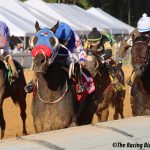In Virginia, “gray games” need more clarity
Opinion by Nick Hahn
A gaming bill that passed Virginia’s General Assembly March 1 could gray the sunny skies that have shined on Virginia’s thoroughbred industry since Colonial Downs reopened in 2019.
The bill now heads to the desk of Virginia’s governor, Glenn Youngkin (R), who has been an avid proponent of Virginia horse racing – and has expressed “serious concerns” about the legislation.
Senate Bill 212, which passed the House 49-43 and the Senate 31-9, opens the door for tens of thousands of slots-like machines to proliferate in every county in Virginia. While those businesses that could benefit – such as truck stops and convenience stores – welcome these so-called skill games, they will likely undermine the economic model that has served Virginia’s horse industry well in recent years.
“The administration has serious concerns with both the House and Senate versions of the bill,” Youngkin spokesman Rob Damschen told the Virginia Mercury on February 26, prior to the General Assembly’s vote. “There are numerous issues to work through including the regulatory structure, tax rates, the number of machines, impact on the Virginia Lottery and broader public safety implications.”
Very little of that was addressed when the bill passed through conference committee.
The “gray games” bill was named initially for the quasi-legal status of these machines when they first appeared in Virginia, in restaurants, convenience stores and truck stops. In contrast to the approval path of the casinos recently opened in Virginia or the longer standing parimutuel wagering that supports Virginia’s horse racing industry, gray games operators have taken a more antagonistic approach towards implementation.
Gray games are substantially similar to slot machines but include a “skill” component that differentiates them from traditional slot machines. That skill component also, proponents initially argued, exempted them from other state laws governing gambling.
Initially showing up in Virginia in 2018 without regulation or legislative approval, the number of gray machines soared in 2019 from a few hundred to thousands, while the same year Colonial Downs reopened largely because of historic horse racing machines (HHR) approved by the General Assembly in the previous year.
Under Virginia law, the number of HHR terminals is currently capped at 5,000. Colonial’s owner, Churchill Downs Inc. (CDI), hopes to have 4,700 terminals in operation later this year at their Rosie’s Emporium locations in eight different venues across the state. Parimutuel wagering and casino gaming, including HHR, must pass local referenda to be approved and are subject to statewide total terminal caps.
CHECK OUT THE LATEST OFF TO THE RACES RADIO!
By contrast, while SB 212 limits the number of gray games machines at each venue, it places no upper bound on the statewide number; analysts expect the number of gray games will far exceed the permitted number of HHR terminals. In addition, the legislation would prevent local governments from limiting or regulating gray games.
“Let’s let the locality decide whether they want them or not because up to this point, the people in that locality had no choice,” Debbie Easter, president of the Virginia Equine Alliance, said Feb. 24 on Off to the Races Radio.
Gray gaming advocates boast that the machines serve Virginia’s small businesses, even naming the bill the Virginia Small Business Economic Development Act.
But Virginia’s original small businesses, farms, especially horse farms, may suffer, whether localities concur or not. And in 2019 when gray games first appeared, the Virginia Lottery estimated them to cause the Lottery revenue to drop by as much as $140 million.
In the passing of the bill in 2018 that brought HHR machines the General Assembly locked in a critical measure to ensure the future of live racing in Virginia. Every 100 HHR terminals, brings at least one live racing day to Colonial Downs each year. In addition, the legislature directed that a portion of HHR revenue go to racing purses and other elements of the horse industry.
The gray gaming bill contains no such provisions, though the proliferation of these games could – and likely will – impact revenue from HHR.
Virginia racing’s presence is significant throughout the entire Commonwealth. From Richmond to Charlottesville, from Northern Virginia to Roanoke, the industry had in 2019 an overall economic impact in Virginia of $542.1 million and supported over 5,000 jobs, according to one study.
While the impacts may be greater in some places, like Northern Virginia, than others, they show up statewide. In 2018, for example, Long On Value – the first Thoroughbred bred in Augusta County in nearly two decades – became Virginia’s 19th million-dollar earner.
And last summer Virginia-bred Gigante, from Smitten Farm in The Plains, won the $500,000 Secretariat Stakes (G2) in his home state, at Colonial Downs.
Virginia’s breeding industry was a powerhouse for decades, despite the absence of parimutuel wagering in the state, which had been outlawed in 1897. The birth of Colonial Downs in 1997 followed a decadeslong effort by local horsemen and breeders and required approval via local referendum, which in New Kent passed overwhelmingly.
Debbie Easter interview on gray games starts at about 30 minutes
The track’s demise following the 2013 race meet seemed to herald the end of the story.
It was only through the passage of HHR, a form of gaming hosted by the track operator, modeled after parimutuel racing and regulated by the Virginia Racing Commission, that a new operator, Peninsula Pacific Entertainment, LLC, stepped forward to purchase Colonial Downs, now owned by CDI, (Churchill Downs).
Now Virginia racing looks poised for strong growth. Maybe.
“These [gray] games are proliferating all through the state. We had to run a statewide referendum for parimutuel, and then before we could put up a Rosie’s Entertainment Center, we have to run a local referendum, and there is none of that with these machines,” added Easter.
In short, Virginia horsemen have been at this for at least 80-plus years. Now with a stable economic model and demonstrated racing success tied directly to thoroughbred farms, this quick action threatens to undermine this success in mere months.
It is the burden, or weight, of hosting a race that churns an economic impact for thousands of jobs. Not only is it a job generator, but it’s also a job multiplier in the fields of agri-business, commerce, hospitality and even regulation.
Gray games may be a quick fix for some businesses. But they could have severely negative consequences for the horse industry.
This eleventh hour rush to approve gray games comes at the expense of decades of above-board initiatives that now thrive. It needs some rethinking of its own.
LATEST NEWS















